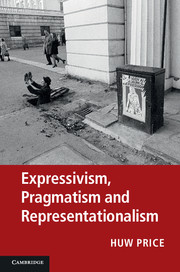Book contents
- Frontmatter
- Dedication
- Contents
- Notes on contributors
- Preface
- PART I THE DESCARTES LECTURES 2008
- PART II COMMENTARIES
- 4 Pragmatism: all or some?
- 5 Global anti-representationalism?
- 6 Naturalism, deflationism and the relative priority of language and metaphysics
- 7 How pragmatists can be local expressivists
- PART III POSTSCRIPT AND REPLIES
- Bibliography
- Index
7 - How pragmatists can be local expressivists
Published online by Cambridge University Press: 05 July 2013
- Frontmatter
- Dedication
- Contents
- Notes on contributors
- Preface
- PART I THE DESCARTES LECTURES 2008
- PART II COMMENTARIES
- 4 Pragmatism: all or some?
- 5 Global anti-representationalism?
- 6 Naturalism, deflationism and the relative priority of language and metaphysics
- 7 How pragmatists can be local expressivists
- PART III POSTSCRIPT AND REPLIES
- Bibliography
- Index
Summary
PRAGMATISM AND PLURALISM
Contemporary pragmatists – or perhaps that should be neo-pragmatists – are often sympathetic to expressivist accounts of vocabularies that have often been regarded as metaphysically problematic: moral and modal vocabulary, for example. Huw Price is one of the most prominent such philosophers. At the same time, as Price has been quick to recognise, there is a question of whether pragmatists such as himself have the right to such sympathy. The question circles round the issue of what James Dreier (2004) has called ‘creeping minimalism’. I want to suggest an answer. But first I need to set up the problem.
Let me begin with a few words about the distinctive character of contemporary neo-pragmatism (which from now on I shall just call ‘pragmatism’). According to David Macarthur and Huw Price, pragmatism is defined by two commitments.
Linguistic Priority. When dealing with metaphysical issues, don't start by asking about (say) the nature of values: examine what is distinctive about evaluative language.
Anti-representationalism. Representationalists explain the (proper) use of vocabulary items in terms of their meanings, and explain meaning (at least of non-logical vocabulary) in terms of semantic (word-world) relations, such as reference. By contrast, anti-representationalists eschew the use of semantic notions as explanatory primitives. All vocabularies – semantic vocabulary included – are to be characterized (or explained) functionally, in terms of their use properties. Oversimplifying a bit, meaning does not explain use: use explains meaning.
Macarthur and Price thus offer the following equation:
Pragmatism = linguistic priority + anti-representationalism.
Information
- Type
- Chapter
- Information
- Expressivism, Pragmatism and Representationalism , pp. 128 - 144Publisher: Cambridge University PressPrint publication year: 2013
Accessibility standard: Unknown
Why this information is here
This section outlines the accessibility features of this content - including support for screen readers, full keyboard navigation and high-contrast display options. This may not be relevant for you.Accessibility Information
- 46
- Cited by
